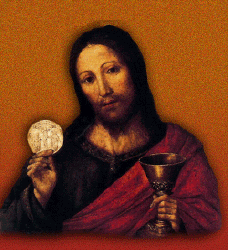Take and Eat

The Body & Blood of Christ
Today’s Readings: Ex. 24:3-8; Ps 116; Heb 9:11-15; Mk 14:12-16, 22-26 [Link to Readings]
It’s a wonderful thing that as we begin our ministry together this weekend, we celebrate two joyous occasions: the Feast of the Body and Blood of Christ, and Father’s Day.
To all the dads here, we offer our collective prayers and thanks. And for those who have gone home to God, we pray that the Lord will bless them abundantly and receive them into the joys of his kingdom.
Sometimes, being a dad isn’t easy. It can be downright painful.
Imagine Jesus’ own heavenly Father watching over the scene in the gospel today. It’s the time of the Last Supper—the final Passover meal Christ ate with his disciples the night before his crucifixion. The Father certainly knew the terrible pain and anguish that his beloved Son would go through over the next 24 hours.
Yet he also knew the awesome graces and blessings that would be set in motion. They would benefit the whole world for all time. And that, of course, is why we’re here 2000 years later, still celebrating this feast.
The Body and Blood of Christ is the Eucharist, or Holy Communion. Jesus’ instructions to his apostles were so simple and clear. He took bread, said “This is my body,” then gave it to them to eat. He took the cup of wine, said “This is my blood,” then passed it to them to drink. He then told them to do just what he did: “Do this in memory of me.” That’s the heart of our mass.
Over these many centuries since the Last Supper, there’s been an awful lot of debate and reflection on what this all means, and how we’re supposed to remember Christ through this holy meal. In fact, part of the sad reason why Christian people have argued and fought and split into many different churches and denominations and sects is over this very issue.
We Catholics have always been extremely biblical in our approach; in other words, we believe exactly what the Scriptures say.
Jesus said, “This is my Body… this is my Blood”—and that’s precisely what we’ve always believed. In faith, we accept that thanks to divine power, mysteriously the bread and wine become the substance of Christ’s actual flesh and blood. Our Eucharist is not just a symbol. It’s the real deal. And yet, eating and drinking it is not cannibalism. How can this be? It’s such a vast mystery that nobody has a clue.
You may remember the passage in John’s gospel where Jesus first told several hundred of his disciples that if they wanted to have life in them, they had to eat his flesh and drink his blood. Quite a few who heard this were horrified and revolted. They walked away from Christ. Do you remember the Lord’s conversation with Peter? He said, “Are you going to leave too?” Peter answered, “Where would we go, Lord? We have come to believe that you have the words of everlasting life.” Maybe Peter didn’t understand… but he believed… he knew the truth.
In our faith, we also believe that the way the Eucharist comes about here and now is through the priesthood. Again, we go back to the very words of the bible. At that same Last Supper, Jesus commissioned or ordained his apostles when he commanded them, “Do this is memory of me.” That’s why we believe that there’s a special sacramental power to convert bread and wine into the Eucharist, and that power is passed along through ordination.
All of us believers are incredibly blessed, because in our church, Holy Communion is available every single day… and in this part of the world, you can actually receive it daily if you wish. It’s as simple as coming to mass.
The Eucharist strengthens us spiritually, and that’s why it’s often called “food for the soul.” Life is not always a picnic, and we all need every bit of help we can get to survive and thrive. That’s what Holy Communion helps us to do.
What the Eucharist also does, in its great power, is transform us. As the famous saying goes, “You are what you eat.” Well, if you eat Christ, you become Christ.
Think about that! The Eucharist helps us to become holier… more loving… more patient, tolerant and forgiving… less afraid to put our lives on the line for the God we serve and the people we love—even when doing what’s right may put us in harm’s way.
On this Father’s Day, it’s good to honor our dads and remember all they’ve done for us. Let’s also give special thanks to our heavenly Father for all the extraordinary blessings he has sent our way—especially the Body and Blood of his Son.

<< Home